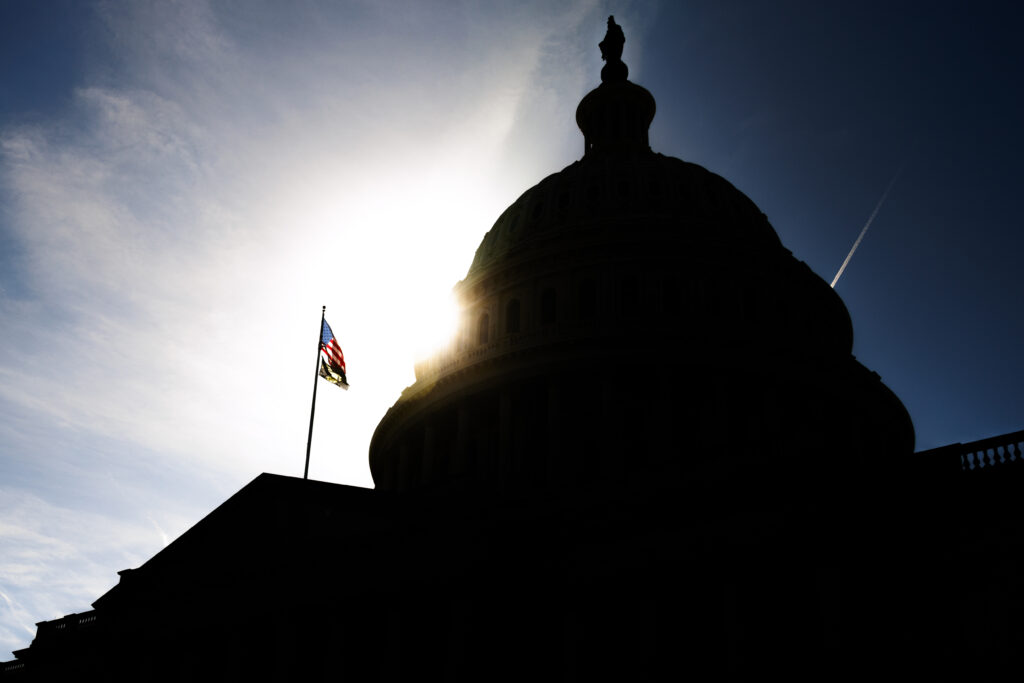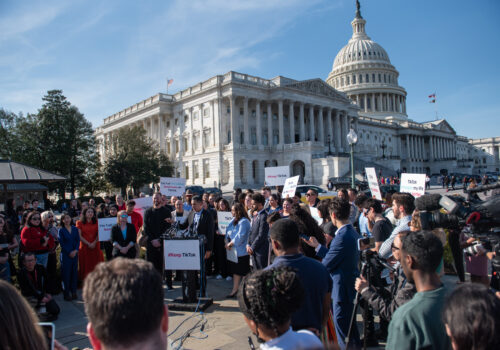The US Congress should force the sale of TikTok or ban the app, and it should pass its long-delayed aid package for Ukraine. Just as important, it should signal to American voters that both represent the front lines in the strategic battle for the global future.
What’s surprising is that the same House Republican minority that has blocked Ukraine funding for more than five months hasn’t made this connection. What might help this group is a close reading of the recently released “Annual Threat Assessment of the US Intelligence Community”—and Peggy Noonan’s latest Wall Street Journal column.
News reports have focused public attention on the new intelligence report primarily because of its assessment of Israeli Prime Minister Benjamin Netanyahu’s “viability as a leader” as being “in jeopardy.” Even more important, however, are the links it draws between regional conflicts in Europe and the Middle East and our unfolding, generational contest with China to shape the future.
“During the next year,” the assessment explains, “the United States faces an increasingly fragile global order strained by accelerating strategic competition among major powers, more intense and unpredictable transnational challenges, and multiple regional conflicts with far-reaching implications.”
Regarding Beijing, the assessment underscores China’s growing efforts online, resembling the long-standing Moscow playbook, “to exploit perceived US societal divisions . . . for influence operations.” That includes experimentation with artificial intelligence. TikTok accounts run by a Chinese government propaganda arm “reportedly targeted candidates from both political parties during the US midterm election cycle in 2022,” it notes, something the Atlantic Council’s Digital Forensic Research Lab was the first to show through an open-source investigation.
In a valuable new report, the Atlantic Council’s own analysts stopped short of calling for a breakup or ban of TikTok as a means of addressing the platform’s threats to US national security. “TikTok: Hate the Game, Not the Player” argues that an exclusive focus on the Chinese app overlooks “broader security vulnerabilities in the US information ecosystem.”
Peggy Noonan makes a compelling case for why the United States should nevertheless target TikTok. “It uses algorithms to suck up information about America’s 170 million users, giving it the potential to create dossiers,” she writes. Federal Bureau of Investigation Director Christopher Wray, Noonan adds, has warned that China “has the ability to control software on millions of devices in the US.”
That brings me to Ukraine.
It’s difficult to gather hard evidence to illustrate how the Chinese government is deploying the TikTok weapon, yet the existing and potential dangers were sufficient to prompt a bipartisan House vote against it of 352-65, unifying members of Congress such as Democrat Nancy Pelosi and Republican Elise Stefanik, who are more often poles apart.
By comparison, the evidence of Russian President Vladimir Putin’s murderous intentions is incontestable. Russian forces are advancing, and US dithering is costing Ukrainian lives. It’s also encouraging an increasingly close autocratic partnership built on the shared belief that now is the moment to test US and Western staying power and resolve.
“Russia’s strengthening ties with China, Iran, and North Korea to bolster its defense production and economy are a major challenge for the West and its partners,” says the new report by the US intelligence community. On Tuesday, Reuters reported that Putin will visit Chinese leader Xi Jinping in May, building upon what he has called their “no limits” partnership.
Weeks ago, a large Senate majority voted in favor of an aid package that would bring $60 billion in aid to Ukraine alongside support for Israel and Taiwan. A similar House majority would support that, but thus far a small Republican minority in the lower chamber has blocked a vote. This needs to be fixed quickly either by Speaker Mike Johnson permitting a floor vote, or through a discharge petition signed by a bipartisan majority.
With the stakes of such a historic nature, the United States and its allies should address both Russia’s military threats, with Chinese support, and Chinese influence operations, with Russian inspiration.
It’s not one or the other—but both. And now.
Frederick Kempe is president and chief executive officer of the Atlantic Council. You can follow him on Twitter: @FredKempe.
This edition is part of Frederick Kempe’s Inflection Points Today newsletter, a column of quick-hit insights on a world in transition. To receive this newsletter throughout the week, sign up here.
Further reading
Wed, Mar 13, 2024
Will the US crack down on TikTok? Six questions (and expert answers) about the bill in Congress.
New Atlanticist By
The US House has just passed a bill to force the Chinese company ByteDance to either divest from TikTok or face a ban in the United States.
Thu, Mar 14, 2024
All the autocrat’s men: The court politics of Putin’s inner circle
Russia Tomorrow By Mikhail Zygar
A new Atlantic Council report by journalist Mikhail Zygar explores how Russia's war on Ukraine has affected Vladimir Putin's inner circle.
Fri, Mar 15, 2024
Help Ukraine win—or risk kicking off a US losing streak
New Atlanticist By Tod D. Wolters, Ann Marie Dailey
Supporting Ukraine isn’t charity. It is a way for the United States to reassert itself at a time when its influence is faltering.
Image: The silhouette of the Capitol Building is being seen on Tuesday, March 12, 2024. (Photo by Aaron Schwartz/NurPhoto)



